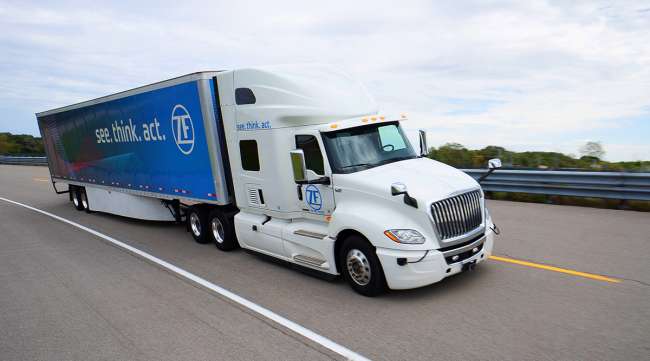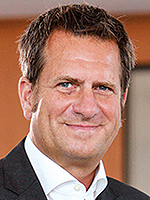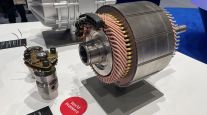Senior Reporter
ZF Steers Course Deeper Into Commercial Vehicle Opportunities

[Stay on top of transportation news: Get TTNews in your inbox.]
ZF Friedrichshafen AG is looking to nearly double its 2019 revenue from its commercial vehicle segment, which now includes its $7.1 billion acquisition of Wabco Holdings Inc.
Commercial vehicle revenue in 2019 at ZF was $4.4 billion, or 12% of its total revenue of $43 billion — which is predominantly driven by automotive sales.
At Wabco in the same period it was $3.4 billion.

Staedtler
“We are looking to really see this [combined commercial vehicle] piece of the pie grow steadily to 20%. This is very exciting for us internally to be a bigger player inside ZF in the commercial vehicle arena,” said Fredrik Staedtler, head of ZF’s new commercial vehicle control systems division, a temporary 10th division ZF created to house Wabco, which was acquired in May.
The new unit will combine with ZF’s existing commercial vehicle segment in January 2022.
Customers had some clear advice for ZF at the time of the acquisition, which came as the COVID-19 pandemic swept the globe, and that was stay focused on performance and keep them informed, he said.

“That’s why we elected to run in parallel for 18 months,” Staedtler told Transport Topics. “We gave ourselves time to integrate and connect properly, while continuing to focus on the customers as well as the performance of the organization.”
ZF noted the combination of businesses was expected to further accelerate the development of new technologies to enable autonomous commercial vehicle functions, make ZF less dependent on the economic cycle of the passenger car industry and, for the first time, expand the company’s expertise to include commercial vehicle braking solutions.
Then, as a result of adapting to the COVID-19 pandemic, ZF experienced a tremendous reset.
“There was a ramping down and a ramping up with all the difficulties you could imagine coming, and we are seeing changes in the culture and working life — more remote work, different leadership approaches, more empowerment for employees to take action,” Staedtler said. “There was a heavy, heavy increase in trying to connect even more to the customer in this very difficult time in the world and North America, where we want to be the partner of choice for uptime.”

According to Shelley Dellinger of Cargo Transporters and Alphonso Lewis, ATA’s Road Team Captain and YRC Freight driver, diversity in recruitment methods is essential. Hear a snippet, above, and get the full program by going to RoadSigns.TTNews.com.
One soon-to-be product launch is its PowerLine medium-duty automatic transmission scheduled for the second quarter of 2021, putting ZF into head-to-head competition with Allison Transmission Inc. “and others,” he said. “It is based on the eight-speed technology we have developed for the passenger car” and intended for trucks, heavy pickups and buses.
Allison said its targeting for release in 2022 an automatic nine-speed transmission for medium- and heavy-duty vehicles.
“We see the North American market as distinctly special and different,” Staedtler said. “With the fleet pull and the influences of the OEMs, we need to have a very dedicated, powerful organization on site, so to speak, in the country serving the markets and customers.”
Driveline, chassis, braking and steering technologies still have an important role to play, and ZF continues to drive toward its goals of increasing safety and improving fuel efficiencies, he said. “That’s first and foremost where we keep our eye on, well-known technologies.”

Home | Video | Heroes' Photo Gallery
Saluting the men and women of the trucking industry who kept America's essential goods flowing during the coronavirus pandemic.
Heroes: Peter Lacoste | Susan Dawson | James Rogers | Reggie Barrows | Kevin Cooper | Cesar Quintana Moreno
At the same time, the company is investing in automated, connected and electrified technologies.
That includes applying its product portfolio to fuel cell technology, especially for longhaul applications, he said.
“We have also had a good history and track record of electrifying city buses, especially in Europe. Our solutions on the drivetrain are somewhat agnostic with batteries or fuel cells,” he said. “I see a lot of good development there, still.”
As for automation in commercial vehicles, he said there was still a lot of educating the industry has to do to build acceptance of what is seen as a very disruptive technology. “The media side, the suppliers, OEMs, the new players, all have an important role in making this education. We are very, very far away from taking drivers out of the truck. And this is not just us, but the industry.”
ZF’s only goal is clearly a phased approach with the No. 1 priority being the safety of the drivers and of their equipment, he said, citing lane departure warnings and forward collision warnings as key stepping stones.
And in the meantime, the industry will work on targeted use cases, like platooning and, eventually, highway piloting, which operates in certain situations like the autopilot on an airplane, he said. “We are looking at automation in the sense of how can we provide solutions for the problems of the future that will directly benefit bottom lines.”
ZF Friedrichshafen AG is headquartered in Friedrichshafen, Germany. The Zeppelin Foundation owns 93.8% of the company. These shares are managed by the city of Friedrichshafen.
Want more news? Listen to today's daily briefing:
Subscribe: Apple Podcasts | Spotify | Amazon Alexa | Google Assistant | More



